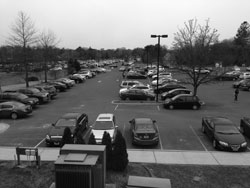Yes, we are all relieved that midterms are over and that means we are just that much closer to summer vacation.
However, that doesn’t mean that the rest of the spring semester will be without its aggravating moments. I am speaking of the parking lot situation at MU, that I think I can speak for all of the student body how aggravating and frustrating it truly is.
I know for a fact that one of the biggest annoyances for MU students in recent years has been the poorly orchestrated parking situation on campus.
Finding a spot was always a hassle at this campus. However, now with the current construction of Pozycki Hall, the parking lot is crazier than ever, at all times of the day. With the ongoing construction, several of the parking spots in front of Bey Hall are fenced off and inaccessible.
This means available spaces are even fewer and farther between which, speaking as a commuter who has to show up 30 minutes early for a 1 pm class to fight for an open spot, can get very old, very fast.
Not only are cars following students back to their cars, people are challenging one another on who can pull into the spot first.
This issue has made me very curious to wonder how other schools orchestrate their student parking lots and if the asphalt is any greener on the other campus.
To see if this is the case, let’s look at Rutgers University as an example. The largest college in the state of NJ handles student parking very differently from MU.
Ashley Fedor, a 21-year-old psychology major at Rutgers described the school’s policy.Since Rutgers’ New Brunswick campus contains three of its own campuses, College Avenue, Douglass and Livingston, the school allows students to park on whichever campus they have the majority of their classes on.
Fedor said that students can register their cars online and they receive a tag to hang from their rearview mirror, similar to the stickers that MU students stick in their windows.
This tag means students essentially have their own parking spot. Fedor said, “I park in a four level parking deck and I can park in whichever space I want in that parking garage.”
However, this convenience of always having a place to put your car comes at a price. Fedor mentioned that students need to pay $299 a year for parking (pretty affordable when compared to the $350 MU resident students pay annually).
Depending on the weather, your ability to park in your assigned lot may be affected and finding another one isn’t as easy as landing in the next open space you see.
After one of the many snowstorms we experienced this winter, Fedor, who commutes to New Brunswick for class, said when she got to the Douglass campus to park before class; the top level of her parking garage wasn’t plowed.
Because of this and the other spots being full, she couldn’t find a parking spot. “If I parked on another campus I would have been fined,” Fedor said.
“I could have parked at a meter, but you have to pay for the two hours, or whatever it is, and you can’t always find a spot there either” Fedor said. So she decided it wasn’t worth risking the fine and missed class that day.
So while it seems like Rutgers has a better parking setup, their system is also not without its downsides.
MU students may sometimes have to arrive early and play parking lot roulette, hoping to get lucky and snatch up the first empty spot, but there are parking attendants to watch your car and you can drive to another lot on campus and park without risking a hefty fine or being forced to find a working parking meter.
Pozycki Hall will eventually be finished and the parking situation will return to normal. So while it’s irritating now, we just need to make the best out of a bad situation.
Yes Rutgers’ system is different, but it isn’t perfect either.
PHOTO TAKEN by Jacklyn Kouefati



